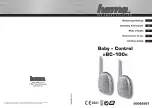
92
English
■
DIGITAL LINK Terminal connection
A twisted pair cable transmitter, such as the Panasonic
device that supports DIGITAL LINK output (ET-
YFB100G, ET-YFB200G) uses twisted pair cables to
transmit inputted video and audio signals, and these
digital signals can be input to the Display via the
DIGITAL LINK terminal.
Display (Back of the unit)
PC
DIGITAL LINK/LAN terminal
LAN cable (commercially available)
Example: Panasonic ET-YFB100G
Hub or broadband router
Note
●
When using a DIGITAL LINK connection, set each
item in [Network settings]. (see page 77)
Precautions for use while connecting with a twisted
pair cable transmitter
About installation / connection
●
Ask a professional or the dealer to carry out the cable
wiring work for DIGITAL LINK connections. Insufficient
wiring work may cause the inability to apply the cable
transmission characteristics and cropped or fuzzy
images and sounds.
●
The transmission distance between the twisted pair
cable transmitter and the device is normally up to
100 meters. When the transmitter supports [Long
reach] communication method, the transmittable
distance is up to 150 m. Please note that if exceeding
the limit, video or audio may be interrupted,
or malfunction may be caused during LAN
communication. Furthermore, when connecting using
[Long reach] communication method, depending on
the specification of the transmitters, transmittable
video signals or the distance may be limited.
●
The transmission distance between the twisted pair
cable transmitter and the device is up to 100 meters.
When transmitting 4K signal, the maximum is
50 meters.
Exceeding this distance can cause cropped images or
sounds, as well as LAN communication errors.
●
Do not use a hub between the twisted pair cable
transmitter and the device.
●
When connecting the Display using the twisted pair
cable transmitter (receiver) of other manufacturer,
do not use another twisted pair cable transmitter
between the twisted pair cable transmitter of other
manufacturer and this device. The images and
sounds may be interrupted or become unstable.
●
If possible, lay the cable extended and not coiled in
order to minimize both external and internal noise.
●
Lay out cables of the twist pair cable transmitter and
this product away from other cables, especially from
the power supply cable.
●
When laying multiple cables, keep them together as
close as possible running parallelly and not bundled.
●
After laying the cable(s), check that the signal quality
in [DIGITAL LINK status] is -12 dB or below.
About Twisted pair cables
●
Between the twisted pair cable transmitter and
the device, use a LAN cable that conforms to the
following conditions.
•
It meets or exceeds CAT5e standards
•
It is a straight cable
•
It is a shielded cable (with a connector)
•
It is a solid cable
●
When laying the cable(s), use an instrument such as
a cable tester or cable analyser and check whether
the cable characteristics are CAT5e or above. When
using a relay connector along the path, also include
this in the measurements.
●
Do not pull cables hard. Also, avoid bending or folding
them forcefully.
















































